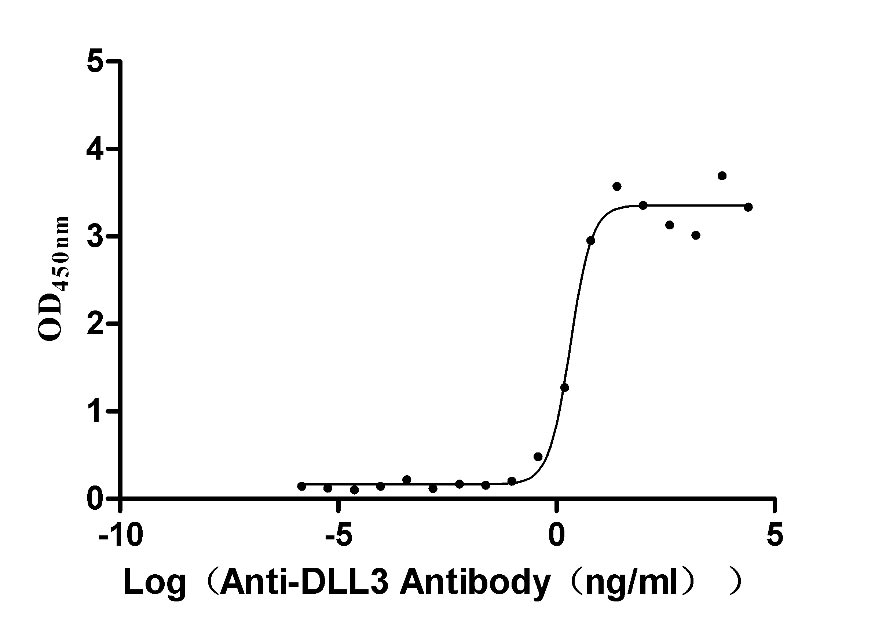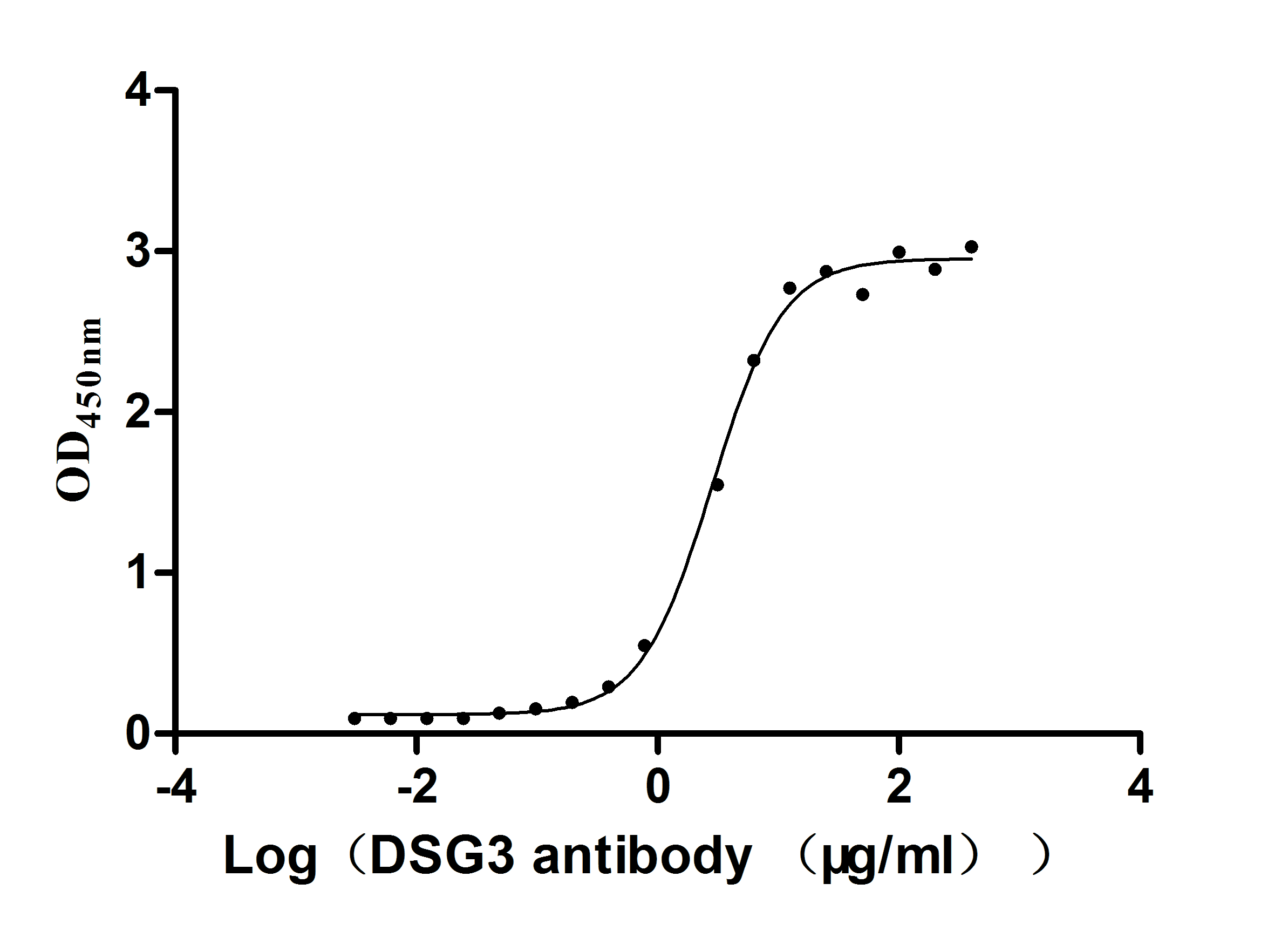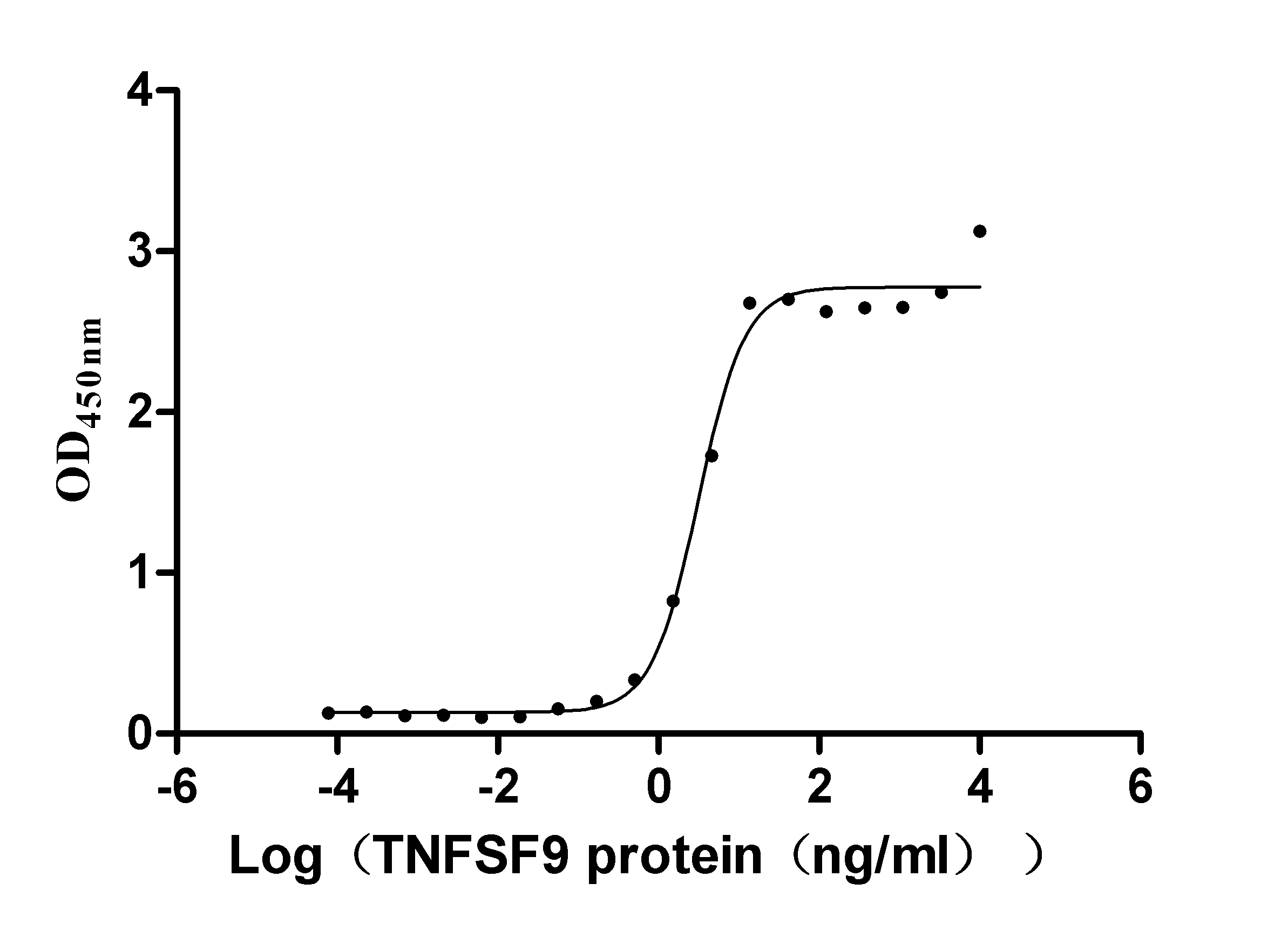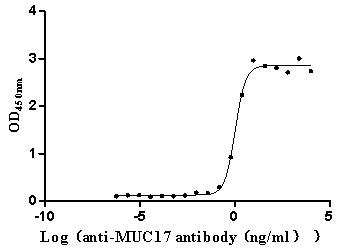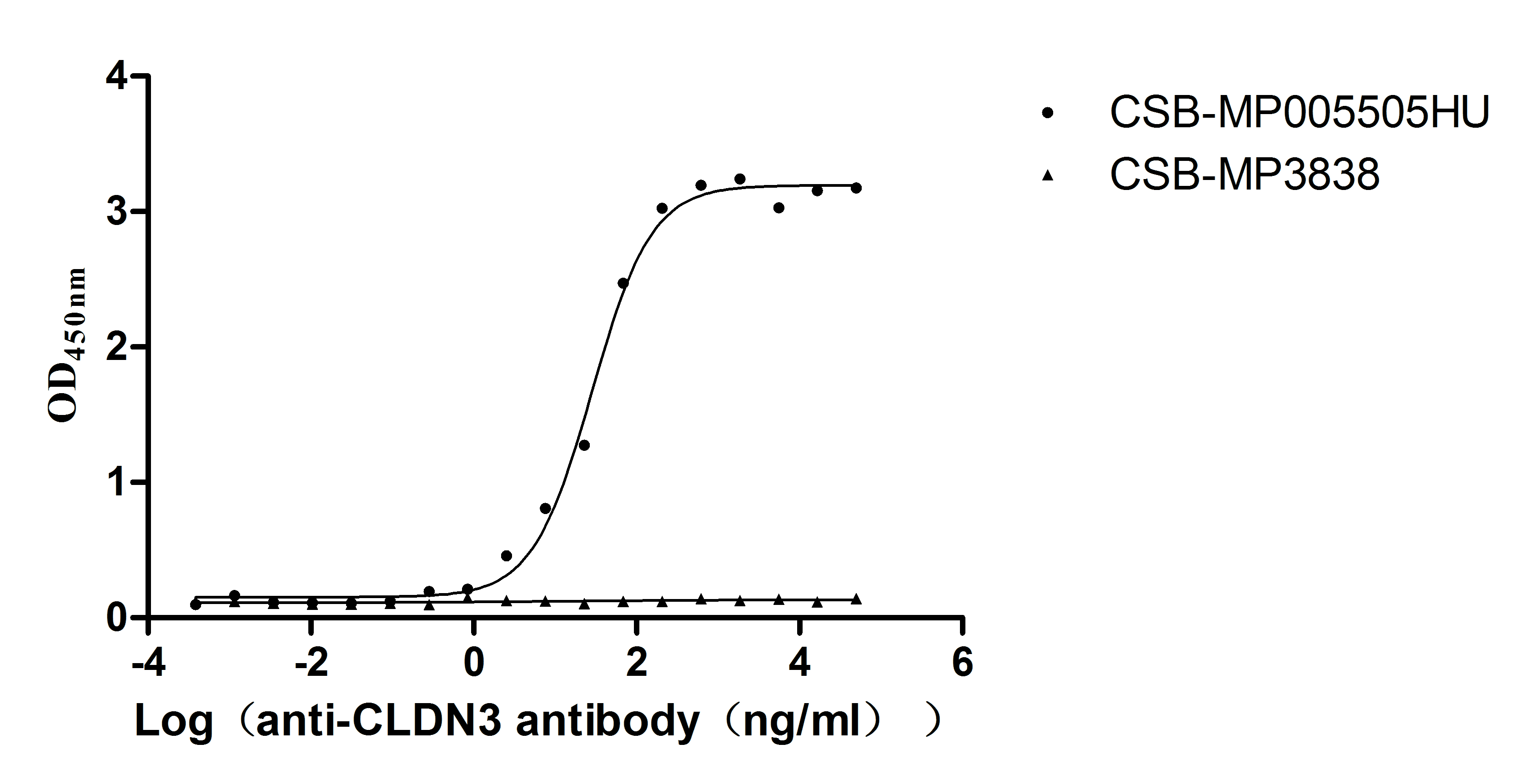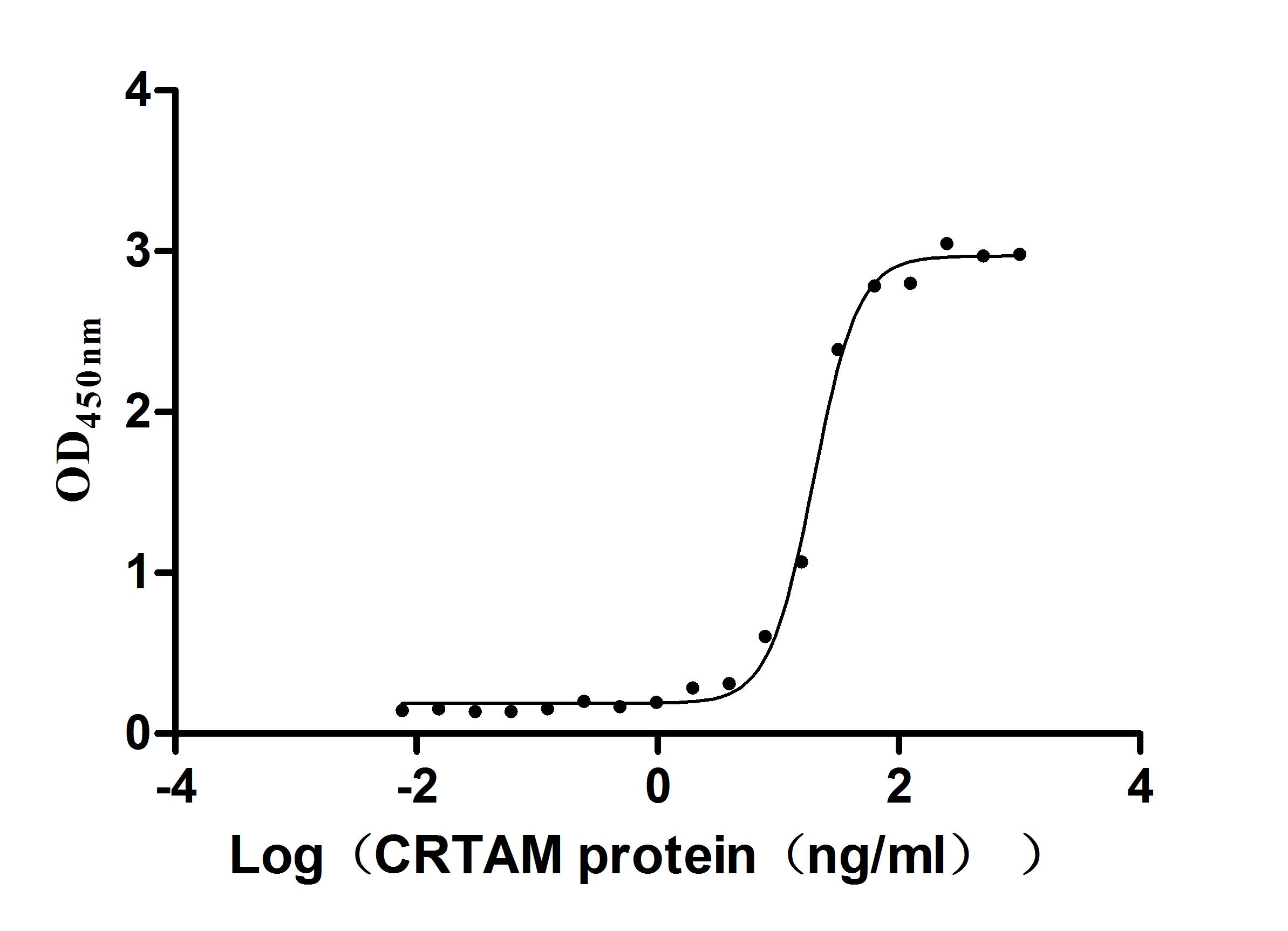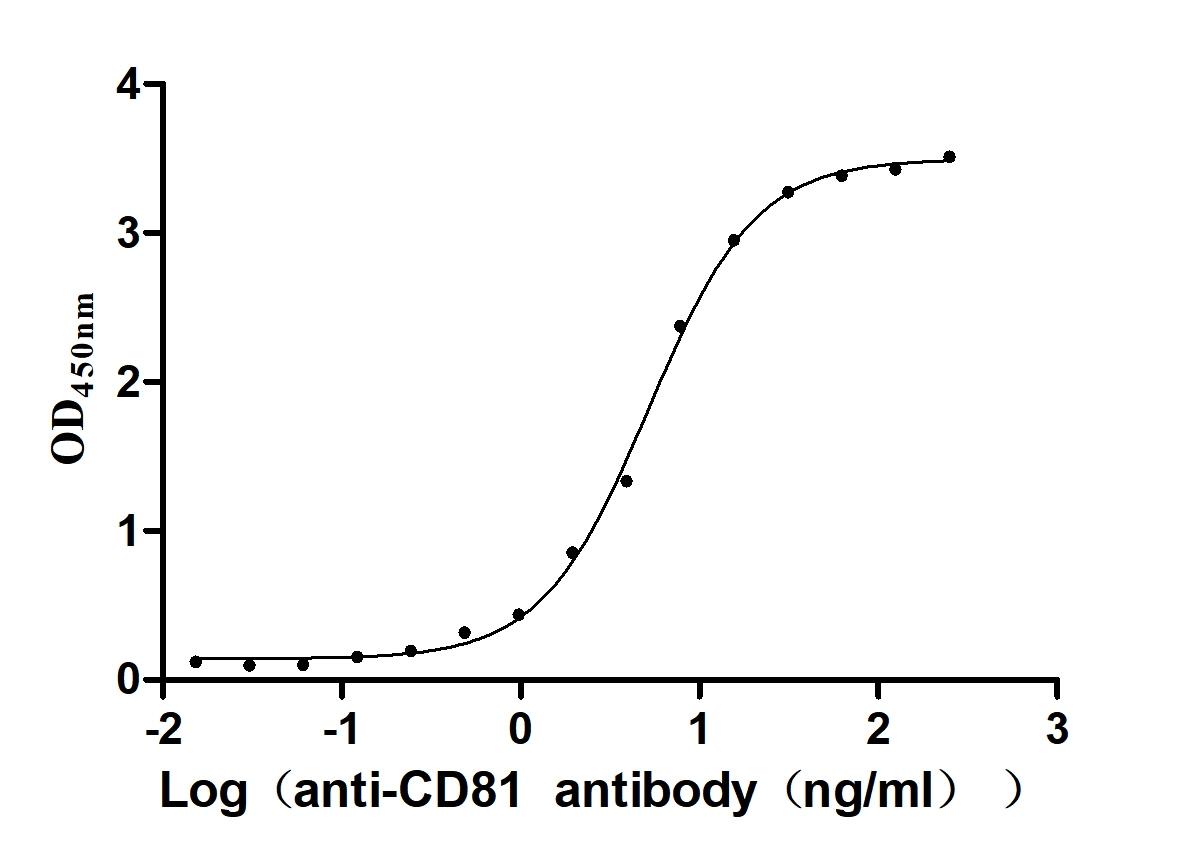Recombinant Human Alpha-N-acetylneuraminide alpha-2,8-sialyltransferase (ST8SIA1), partial
-
中文名称:人ST8SIA1重组蛋白
-
货号:CSB-YP838738HU
-
规格:
-
来源:Yeast
-
其他:
-
中文名称:人ST8SIA1重组蛋白
-
货号:CSB-EP838738HU
-
规格:
-
来源:E.coli
-
其他:
-
中文名称:人ST8SIA1重组蛋白
-
货号:CSB-EP838738HU-B
-
规格:
-
来源:E.coli
-
共轭:Avi-tag Biotinylated
E. coli biotin ligase (BirA) is highly specific in covalently attaching biotin to the 15 amino acid AviTag peptide. This recombinant protein was biotinylated in vivo by AviTag-BirA technology, which method is BriA catalyzes amide linkage between the biotin and the specific lysine of the AviTag.
-
其他:
-
中文名称:人ST8SIA1重组蛋白
-
货号:CSB-BP838738HU
-
规格:
-
来源:Baculovirus
-
其他:
-
中文名称:人ST8SIA1重组蛋白
-
货号:CSB-MP838738HU
-
规格:
-
来源:Mammalian cell
-
其他:
产品详情
-
纯度:>85% (SDS-PAGE)
-
基因名:ST8SIA1
-
Uniprot No.:
-
别名:8-sialyltransferase 8A; 8-sialyltransferase; Alpha 2,8 sialyltransferase 8A; Alpha N acetylneuraminide alpha 2,8 sialyltransferase; Alpha-2; Alpha-N-acetylneuraminide alpha-2; Disialoganglioside (GD3) synthase; Ganglioside GD3 synthase; Ganglioside GT3 synthase; Ganglioside specific alpha 2,8 polysialyltransferase; GD3S; SIA8A_HUMAN; Sialyltransferase 8 (alpha N acetylneuraminate: alpha 2,8 sialytransferase, GD3 synthase) A; Sialyltransferase 8A (alpha N acetylneuraminate: alpha 2,8 sialyltransferase, GD3 synthase); Sialyltransferase 8A; Sialytransferase St8Sia I; SIAT8; SIAT8-A; SIAT8A; ST8 alpha N acetyl neuraminide alpha 2,8 sialyltransferase 1; ST8 alpha N acetyl neuraminide alpha 28 sialyltransferase 1; ST8Sia I; ST8SIA1; ST8SiaI
-
种属:Homo sapiens (Human)
-
蛋白长度:Partial
-
蛋白标签:Tag type will be determined during the manufacturing process.
The tag type will be determined during production process. If you have specified tag type, please tell us and we will develop the specified tag preferentially. -
产品提供形式:Lyophilized powder
Note: We will preferentially ship the format that we have in stock, however, if you have any special requirement for the format, please remark your requirement when placing the order, we will prepare according to your demand. -
复溶:We recommend that this vial be briefly centrifuged prior to opening to bring the contents to the bottom. Please reconstitute protein in deionized sterile water to a concentration of 0.1-1.0 mg/mL.We recommend to add 5-50% of glycerol (final concentration) and aliquot for long-term storage at -20℃/-80℃. Our default final concentration of glycerol is 50%. Customers could use it as reference.
-
储存条件:Store at -20°C/-80°C upon receipt, aliquoting is necessary for mutiple use. Avoid repeated freeze-thaw cycles.
-
保质期:The shelf life is related to many factors, storage state, buffer ingredients, storage temperature and the stability of the protein itself.
Generally, the shelf life of liquid form is 6 months at -20°C/-80°C. The shelf life of lyophilized form is 12 months at -20°C/-80°C. -
货期:Delivery time may differ from different purchasing way or location, please kindly consult your local distributors for specific delivery time.Note: All of our proteins are default shipped with normal blue ice packs, if you request to ship with dry ice, please communicate with us in advance and extra fees will be charged.
-
注意事项:Repeated freezing and thawing is not recommended. Store working aliquots at 4°C for up to one week.
-
Datasheet :Please contact us to get it.
靶点详情
-
功能:Catalyzes the addition of sialic acid in alpha 2,8-linkage to the sialic acid moiety of the ganglioside GM3 to form ganglioside GD3; gangliosides are a subfamily of complex glycosphinglolipds that contain one or more residues of sialic acid. Can catalyze the addition of a second alpha-2,8-sialic acid to GD3 to form GT3. Can use GM1b, GD1a and GT1b as acceptor substrates to synthesize GD1c, GT1a and GQ1b respectively. Can synthesize unusual tetra- and pentasialylated lactosylceramide derivatives identified as GQ3 (II3Neu5Ac4-Gg2Cer) and GP3 (II3Neu5Ac5-Gg2Cer) in breast cancer cells.
-
基因功能参考文献:
- These results suggest that curcumin controls hST8Sia I gene expression via AMPK signal pathway in A549 cells. PMID: 30004453
- These results from genotype-phenotype analysis might suggest a possible link between the ST8SIA1 functional promoter haplotype and the clinical severity of TAO [thyroid-associated ophthalmopathy]. PMID: 29047240
- altered expression of miR-33a/let-7e was correlated with ST8SIA1 level, which might contribute to CRC progression PMID: 28751193
- GD3 and GD3S are highly expressed in glioblastoma multiforme (GBM) stem cell, play a key role in glioblastoma tumorigenicity, and are potential therapeutic targets against GBM. PMID: 27143722
- Results show that GD3S regulates stem cell function via c-Met and the expression of GD3S is regulated by FOXC2, a transcription factor functioning downstream of several epithelial-mesenchymal transition signaling pathways. PMID: 25109336
- our study provides support for the GD3-induced cell cycle arrest, disruption of integrin-b1-mediated anchorage, inhibition of angiogenesis and thereby induced apoptosis in pancreatic cancer cells. PMID: 24842107
- Though results are limited by the small sample size, variants in BDNF and ST8SIA may slow down the early response to antidepressants in subjects non-exposed to stressors at the illness onset, with a remarkable gene-environment interaction PMID: 25163442
- TNF-alpha and IL-6 secreted from keratinocytes enhanced ST8SIA1 expression in melanocytes. PMID: 24548412
- This indicates that ST8Sia I is able to act as an oligosialyltransferase in a cellular context. PMID: 22885356
- Results show that G(D3) synthase expression is sufficient to enhance the tumorigenicity of MDA-MB-231 breast cancer cells through a ganglioside-dependent activation of the c-Met receptor. PMID: 20889649
- GD3 has a role in hypoxia susceptibility by disabling the c-Src/NF-kappaB survival pathway resulting in lower Mn-SOD expression PMID: 19956670
- down regulation of GD3 synthase is associated with reduction in GD3 ganglioside expression affecting tumorigenesis and metastasis in F-11 cells. PMID: 11849746
- Human GD3 synthase gene consisted of five exons and span about 135 kilobases. The 5'-flanking region lacked canonical TATA and CAAT boxes, but contained SP1 binding site(s) as in rat and mouse PMID: 12818424
- findings suggest that the disialoganglioside(GD3) synthase gene represents a physiological modulator of vascular smooth muscle cell responses that may contribute to plaque instability in atherosclerosis PMID: 15175338
- has an apoptotic effect on ECV304 cells through downregulation of Bcl-2 expression via dephosphorylation of AKT and CREB PMID: 15196944
- calnexin controls the biological outcome of GD3 accumulation and reveals a novel role in the stress response PMID: 15319364
- The cloning and characterization of ST8SIA1 in humans is reported. PMID: 16120058
- Transcriptional regulation of GD3S expression in Fas-induced Jurkat T-cells shows a critical role of NF-kappa B in regulated expression. PMID: 16481330
- effects of small interfering (si) RNAs against GD3 synthase gene on the expression of ganglioside GD2 and biological phenotypes of human lung cancer cells expressing GD2. PMID: 16862187
- These results indicate that NF-kappaB plays an essential role in the transcriptional activity of human GD3 synthase gene essential for GD3 synthesis PMID: 17913261
- This work advances the hypothesis that GD3 induces a post-translational modification of histone H1 thus influencing the apoptosis process through transcriptional activation/repression of specific genes. PMID: 18261989
- The functions of four conserved residues between the L and S sialylmotifs in human GD3-synthase were investigated, and it was found that these sites are involved in determining the alpha2,8-linkage specificity of GD3-synthase. PMID: 18348864
- Two independent studies support an allelic association of multiple sclerosis with polymorphisms in the ST8SIA1 gene. PMID: 18612409
- Data propose that the recruitment of TG2 into membranes by GD3 might play an important role in the erythroid differentiation in K562 cells. PMID: 18690648
- Ganglioside GD3-Synthase was associated with poor pathohistological grading in breast cancer PMID: 19125296
- Isolation and functional characterization of the human glioblastoma-specific promoter region of the human GD3 synthase (hST8Sia1) gene are reported. PMID: 19280063
- G(D3) synthase overexpression may contribute to increasing the malignant properties of breast cancer cells. PMID: 19335207
- Variants in ST8SIA1 do not play a major role in susceptibility to multiple sclerosis in Canadian families. PMID: 19428123
显示更多
收起更多
-
亚细胞定位:Golgi apparatus membrane; Single-pass type II membrane protein.
-
蛋白家族:Glycosyltransferase 29 family
-
组织特异性:Strongly expressed in melanoma cell lines, adult and fetal brain and to a lesser extent in adult and fetal lung.
-
数据库链接:
HGNC: 10869
OMIM: 601123
KEGG: hsa:6489
STRING: 9606.ENSP00000379353
UniGene: Hs.408614
Most popular with customers
-
Recombinant Macaca fascicularis Delta-like protein 3 (DLL3), partial (Active)
Express system: Mammalian cell
Species: Macaca fascicularis (Crab-eating macaque) (Cynomolgus monkey)
-
Recombinant Mouse Desmoglein-3 (Dsg3), partial (Active)
Express system: Mammalian cell
Species: Mus musculus (Mouse)
-
Recombinant Human Tumor necrosis factor ligand superfamily member 9 (TNFSF9), partial (Active)
Express system: Mammalian cell
Species: Homo sapiens (Human)
-
Recombinant Human Mucin-17 (MUC17), partial (Active)
Express system: Mammalian cell
Species: Homo sapiens (Human)
-
Recombinant Human Claudin-3 (CLDN3)-VLPs (Active)
Express system: Mammalian cell
Species: Homo sapiens (Human)
-
Recombinant Human Cell adhesion molecule 1 (CADM1), partial (Active)
Express system: Mammalian cell
Species: Homo sapiens (Human)
-
Recombinant Human CD81 antigen (CD81), partial (Active)
Express system: Mammalian cell
Species: Homo sapiens (Human)
-
Recombinant Human Dipeptidase 3(DPEP3), partial (Active)
Express system: Mammalian cell
Species: Homo sapiens (Human)


